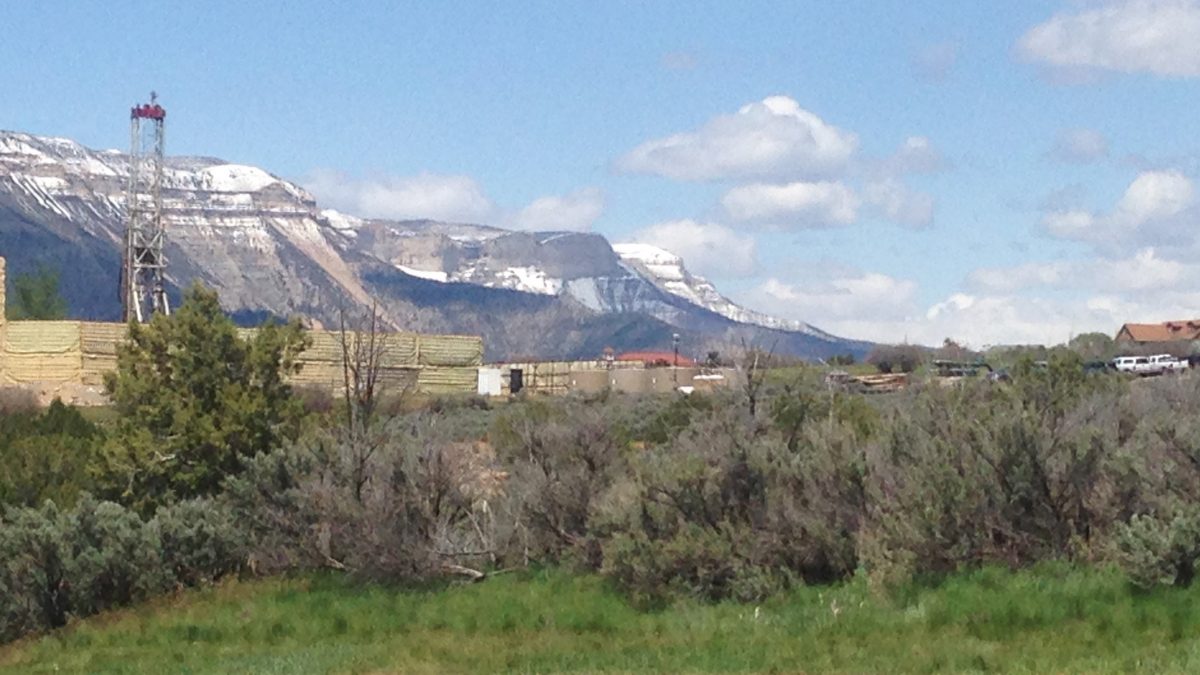- An Alliance For Community Action
- (970) 256-7650
- info@WesternColoradoAlliance.org
With defeat of Prop 112, attention shifts to Air Quality Commission
by Dave Devanney, Battlement Mesa
also printed as a Guest Commentary in the Denver Post, 11/9/2018
Oil and gas development is reaching into every nook and cranny it can find in Colorado, sometimes just 500 feet from neighborhoods and schools. When the energy industry shows up in your community, it brings noise, odors and lighting that affects your quality of life in a very negative way.
I live in Battlement Mesa, a community in the heart of natural gas country in Garfield County. Since the hydraulic fracturing boom began a decade ago, drilling has hit closer and closer to home in communities across the state. Battlement Mesa has changed from a quiet retirement community overlooking the Colorado River into a battleground between some residents and the energy industry.
The effects of gas drilling are glaringly apparent to all who live near a well pad. My neighborhood is often filled with noxious odors, especially when “flowback” is occurring, a part of the fracking process where the driller pushes water into the ground to unleash gas. The water flows back to the surface and brings nasty odors with it. This occurs regularly.
Because Colorado voters did not support Proposition 112, which would have increased the setback distance between drilling and homes and schools, places like Loveland, Greeley, Silt and Battlement Mesa will continue to live with the worst effects of energy development at their doorsteps. However, the state of Colorado has the opportunity right now to take steps to protect air quality and health in communities like mine.
New rules should apply to all of Colorado, not just Front Range
The Colorado Air Quality Control Commission is currently deciding whether to apply common-sense air quality regulations for oil and gas operators across the state. Recent amendments to Regulation 7, as it is known, mandates common-sense practices to limit air pollution, including regular testing of wells and equipment for leaks of methane and other gases and the amendments require prompt repairs when problems are found.
The new rules were crafted after ozone levels on the northern Front Range spiked. The energy industry fought to limit their reach to the nine affected counties, and unfortunately the Air Quality Control Commission agreed. To its credit, the commission also agreed to study the idea of statewide application.
Under the old regulations that are still in effect on the Western Slope, testing of air quality near smaller wells is required just once in the lifetime of the well. Once! This simply isn’t sufficient to protect Colorado’s air quality. We all deserve to breathe clean air, no matter where we live.
In 2018, the American Lung Association’s State of the Air Report also gave multiple Western Slope counties low grades (C or lower) for ozone. La Plata County, which includes the town of Durango, in southwestern Colorado received an “F.” Garfield County, where I live, received a “C” for ozone.
Many residents were sold on Battlement Mesa as a great place to retire. It has a mix of housing to serve all types, a golf course, schools, a great community center and a commercial zone. We thought we would spend our days enjoying the beauty and recreational opportunities of Western Colorado. Instead we have had to organize and fight to protect our community from the worst impacts of drilling.
We didn’t move here to become engrossed in a battle with the energy industry, learn its vernacular and technology, attend countless meetings with policy makers and become community organizers. Unfortunately that is exactly what happened, and we are not alone. Residents on the Front Range and Western Slope have been fighting for years to protect the air and water, their home values and quality of life.
Hydraulic fracturing and other technological advances have made drilling in populated areas possible. It is only fair that industry use the best available technology and practices everywhere they do business to ensure the air we breathe is safe.
Colorado has made impressive policy gains in curbing emissions with the toughest methane rules in the country. We now have the chance to build on that success by requiring energy companies throughout the state to inspect their equipment on a regular basis and make repairs as needed, as well as adopt statewide other practices that are already in effect on the Front Range.
If the commission truly has the health of all Colorado residents in mind, it will apply air quality protections statewide and make the health of our children, elderly and communities the top priority.
Dave Devanney retired from the tech industry and moved with his wife to Battlement Mesa in 2004. He is the chairman of Battlement Concerned Citizens, a committee of Grand Valley Citizens Alliance and Western Colorado Alliance members, formed to protect the community from effects of fracking and gas drilling.


